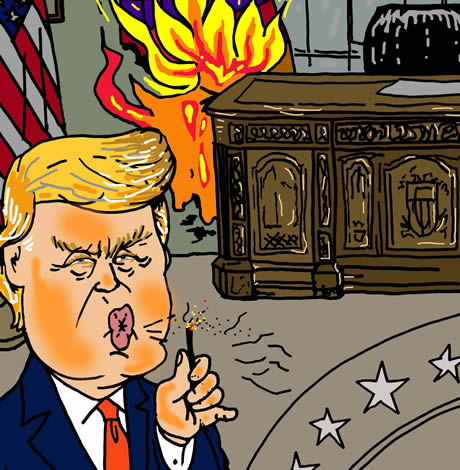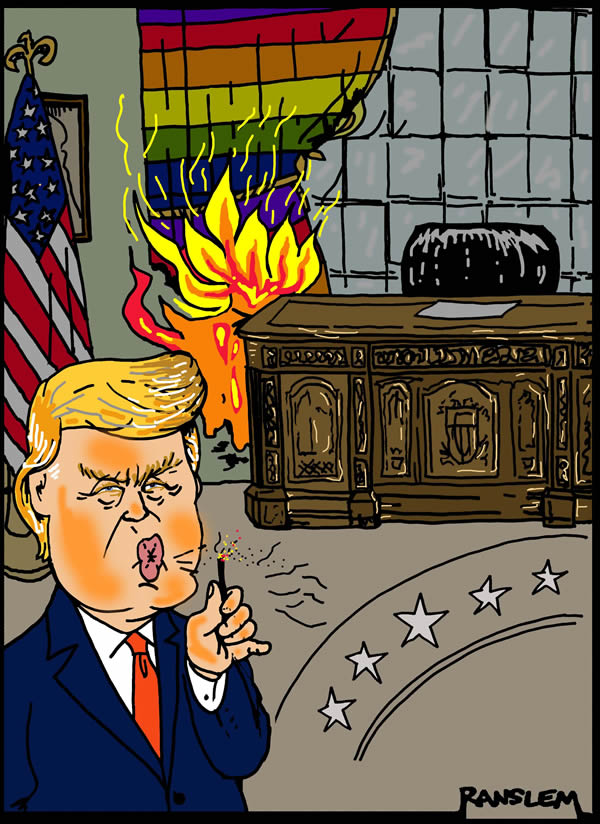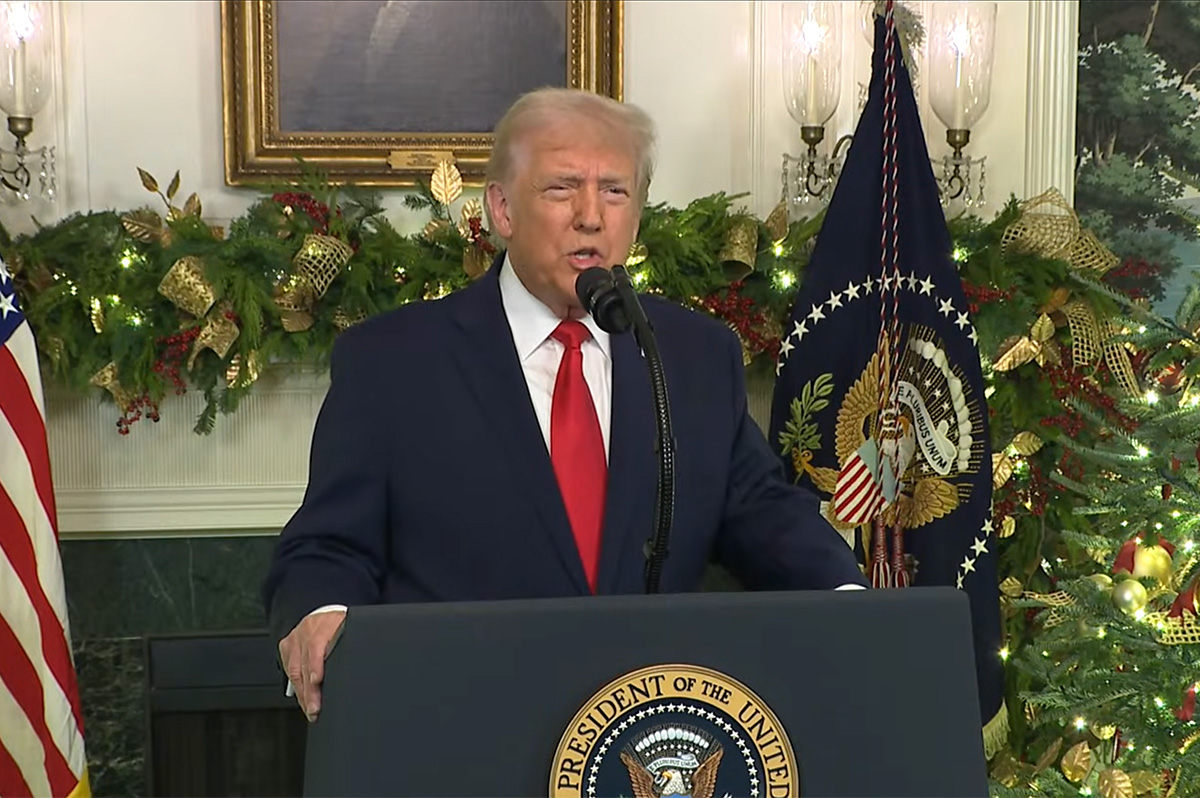Opinions
No pride in backing Trump
Billionaire Thiel cynically puts money before reason


(Washington Blade editorial cartoon by Ranslem)
Gay billionaire Peter Thiel, co-founder of PayPal and a board member at Facebook, is slated to serve as a California delegate for Donald Trump.
His support for the presumptive GOP nominee puts him at odds with every underrepresented group in the country, as well as with his own peers in Silicon Valley.
Mark Zuckerberg, who founded and leads the company Thiel advises, recently said, “I hear fearful voices calling for building walls. Instead of building walls, we can help people build bridges.”
Additionally, Trump has feuded with Amazon’s Jeff Bezos and demanded that Apple manufacture its iPhones in the United States. Thiel’s PayPal co-founder Elon Musk is a Hillary Clinton supporter.
In each election, it seems there emerges a prominent gay supporter for the Republican of the moment, raising the question: Are we a monolith or is it OK for LGBT people to vote Republican, seemingly against their own interests? Of course there are principled Republicans — Allan Kittleman in Maryland comes to mind, along with the New York Republicans who helped pass marriage equality.
Sen. John McCain has been on the wrong side of most LGBT priorities, but he struck a more inclusive tone after winning his party’s nomination in 2008, granting an interview to the Blade (a first for a GOP nominee) and speaking eloquently about the gay people in his life who have impacted him and shaped his views of the community.
Trump isn’t one for such thoughtful discourse, famously deriding McCain’s military service because he “got caught.” Trump’s campaign has dodged our interview requests for a year and he hasn’t had much to say about LGBT issues. But make no mistake that the prospect of a Trump presidency should strike fear into LGBT people from all walks of life — even the billionaires among us.
He has pledged to immediately revoke President Obama’s executive orders, which could include the order that bars discrimination against LGBT employees of federal contractors. That order covers about 20 percent of the entire American workforce. Trump has also promised to nominate Supreme Court justices who would overturn the Obergefell ruling and end marriage equality. He has endorsed the First Amendment Defense Act, a federal version of the so-called “religious freedom” bills that would legalize discrimination against LGBT Americans.
With one Supreme Court seat vacant and three more justices aged 77 or older, it is imperative that Trump not be allowed to make selections to the high court. The names he’s floated so far for the high court are a who’s who of anti-LGBT bigotry.
In addition, the Center for American Progress has compiled a list of eight executive actions benefiting LGBT rights enacted under the Obama administration that Trump could undo. Among them, as the Blade reported this week, is a rule prohibiting anti-LGBT discrimination in health care and insurance, a Department of Housing & Urban Development regulation prohibiting anti-LGBT bias in government-sponsored housing and endorsement of federal LGBT non-discrimination legislation known as the Equality Act.
With such ominous signs of how a President Trump would treat LGBT Americans, why would Thiel (or any other LGBT person) support him? It’s impossible to know for sure in Thiel’s case, because he’s declined interview requests on the subject.
Thiel describes himself as a libertarian. Forbes magazine reported that he was a large donor to 2012 GOP presidential candidate Ron Paul and contributed money to Ted Cruz’s 2012 race for the U.S. Senate in Texas. He also contributed in 2015 to a political action committee raising money for the 2016 presidential candidacy of former Hewlett Packard CEO Carly Fiorina.
More alarming than his pro-Trump leanings, Thiel was recently revealed to be the mastermind behind the Hulk Hogan sex tape lawsuit against Gawker media. He is reportedly nursing a nine-year grudge because Gawker outed him in 2007. The $140 million judgment against Gawker could spell bankruptcy for the gossip site, a frightening prospect that will likely have a chilling effect on media outlets looking to report on the vindictive and thin-skinned businessman.
It’s unconscionable that wealthy and prominent gays would support Trump and enable his overtly racist, nationalistic and homophobic promises. Thoughtful people of all stripes should recognize Trump’s views for what they are — incoherent racist rants — and vote for Hillary Clinton in November.
Opinions
The felon in the White House must be stopped
Are there any decent Republican members of Congress left?

We are up shit’s creek if the felon in the White House actually thinks he has a Nobel Peace Prize. If he believes he deserves one, or Venezuelan opposition leader Maria Corina Machado had any other reason to give him hers, than it was easier, and less degrading, than going on her knees to him, as a number of men already have. I don’t know if she understood how many millions the medal could be worth. Instead, she could have used it for her people, if she didn’t want to keep it.
Machado was awarded the Nobel Prize for her work for the Venezuelan people. She spoke up for them, and fought for them. The felon couldn’t care less about them. He proved that by invading, and then supported Maduro’s vice president as president. He said he, and his fascist cohorts, would run the country, and is now stealing their oil and personally deciding what to do with it. After U.S. troops captured Venezuelan President Nicolás Maduro, Trump said, Venezuelan opposition leader Maria Corina Machado “doesn’t have the support within Venezuela to be its next leader, she was not consulted prior to the operation.” He went on to say, “I think it would be very tough for her to be the leader. She doesn’t have the support within or the respect within the country.” This is the slime bag she gave her Nobel Peace Prize medal to. I hope she is not naïve enough to believe he really cares about her, or her countrymen, and women.
Trump is vile, sick, and mentally deranged. He is threatening foes and allies alike. They see bending a knee to him only works for the moment, but has no long-term impact on his tiny brain. Today, he is threatening Greenland, and our NATO allies are moving their military to Greenland to protect it against the United States. Now he is threatening them with new tariffs. That would have once been unfathomable. He is saber rattling over Iran, Colombia, even Mexico. He is bombing Nigeria and Syria.
If that weren’t enough, he threatens to use the Insurrection Act to send the military into cities here. He has already sent in thousands of ICE agents. ICE is classified as a federal law enforcement agency under the Department of Homeland Security. They have authority to arrest, detain, and investigate immigration violations. However, the law is clear; ICE agents do not have unlimited power. They face significant constitutional restrictions that many people don’t realize, especially when it comes to entering homes and private spaces. But what is clear, in Minneapolis today, some of the agents are acting like the Gestapo. They are smashing car windows, pulling people out of their cars, invading homes, and workplaces, all without first having any proof the people they are going after are guilty of anything. I believe we need fair immigration laws, and they should be enforced. But this is clearly not what the felon is doing. The felon in the White House and his incompetent stooge at Homeland Security, Kristi Noem, who has no idea what the hell she is doing, are acting egregiously, and making a mockery of our democracy.
The president, Noem, Hegseth, Bondi, and the other incompetents in the felon’s Cabinet, simply pretend to forget the history of the United States. They don’t want to accept the truth; we are a nation of immigrants. It is immigrants who built our country, and are still building it. My parents were immigrants escaping from Hitler, and they came here and built a life, and in doing so, added to the greatness of our country. I want every person around the world who needs to escape from dictators, and despots, to be able to do the same as my parents did. We need to build an immigration system that allows them to do that. Instead, because of what this felon is doing, we are seeing American citizens thinking of leaving this country, and looking for asylum in others. That is really sick, but it’s happening.
Sitting in the Oval Office today we have a felon who is reveling in becoming the war president. He is taking the United States down an incredibly dangerous path, threatening our own citizens with violence here at home, and doing the same to our allies around the world. He, and the incompetents and fascists surrounding him, need to be stopped. If there are any decent Republican members of Congress left, they need to join with Democrats, and the voters, to stop him.
Peter Rosenstein is a longtime LGBTQ rights and Democratic Party activist.

January arrives with optimism. New year energy. Fresh possibilities. A belief that this could finally be the year things change. And every January, I watch people respond to that optimism the same way. By adding.
More workouts. More structure. More goals. More commitments. More pressure to transform. We add healthier meals. We add more family time. We add more career focus. We add more boundaries. We add more growth. Somewhere along the way, transformation becomes a list instead of a direction.
But what no one talks about enough is this: You can only receive what you actually have space for. You don’t have unlimited energy. You have 100 percent. That’s it. Not 120. Not 200. Not grind harder and magically find more.
Your body knows this even if your calendar ignores it. Your nervous system knows it even if your ambition doesn’t want to admit it. When you try to pour more into a cup that’s already full, something spills. Usually it’s your peace. Or your consistency. Or your health.
What I’ve learned over time is that most people don’t need more motivation. They need clarity. Not more goals, but priority. Not more opportunity, but discernment.
So this January, instead of asking what you’re going to add, I want to offer something different. What if this year becomes a season of no.
No to things that drain you. No to things that distract you. No to things that look good on paper but don’t feel right in your body. And to make this real, here’s how you actually do it.
Identify your one true priority and protect it
Most people struggle with saying no because they haven’t clearly said yes to anything first. When everything matters, nothing actually does. Pick one priority for this season. Not 10. One. Once you identify it, everything else gets filtered through that lens. Does this support my priority, or does it compete with it?
Earlier this year, I had two leases in my hands. One for Shaw and one for National Landing in Virginia. From the outside, the move felt obvious. Growth is celebrated. Expansion is rewarded. More locations look like success. But my gut and my nervous system told me I couldn’t do both.
Saying no felt like failure at first. It felt like I was slowing down when I was supposed to be speeding up. But what I was really doing was choosing alignment over optics.
I knew what I was capable of thriving in. I knew my limits. I knew my personal life mattered. My boyfriend mattered. My family mattered. My physical health mattered. My mental health mattered. Looking back now, saying no was one of the best decisions I could have made for myself and for my team.
If something feels forced, rushed, or misaligned, trust that signal. If it’s meant for you, it will come back when the timing is right.
Look inside before you look outside
So many of us are chasing who we think we’re supposed to be— who the city needs us to be. Who social media rewards. Who our resume says we should become next. But clarity doesn’t come from noise. It comes from stillness. Moments of silence. Moments of gratitude. Moments where your nervous system can settle. Your body already knows who you are long before your ego tries to upgrade you.
One of the most powerful phrases I ever practiced was simple: You are enough.
I said it for years before I believed it. And when I finally did, everything shifted. I stopped chasing growth just to prove something. I stopped adding just to feel worthy. I could maintain. I could breathe. I could be OK where I was.
Gerard from Baltimore was enough. Anything else I added became extra.
Turning 40 made this clearer than ever. My twenties were about finding myself. My thirties were about proving myself. My forties are about being myself.
I wish I knew then what I know now. I hope the 20 year olds catch it early. I hope the 30 year olds don’t wait as long as I did.
Because the only way to truly say yes to yourself is by saying no first.
Remove more than you add
Before you write your resolutions, try this. If you plan to add three things this year, identify six things you’re willing to remove. Habits. Distractions. Commitments. Energy leaks.
Maybe growth doesn’t look like expansion for you this year. Maybe it looks like focus. Maybe it looks like honoring your limits. January isn’t asking you to become superhuman. It’s asking you to become intentional. And sometimes the most powerful word you can say for your future is no.
With love always, Coach G.
Gerard Burley, also known as Coach G, is founder and CEO of Sweat DC.
Greenland
The Greenland lesson for LGBTQ people
Playbook is the same for our community and Europeans

I understand my own geopolitical limits and don’t pretend to know how Europeans should respond to U.S. threats to seize Greenland or retaliate against anyone who opposes them. However, as I mentioned in March, it’s clear that for Europeans and LGBTQ+ people alike, hug-and-kiss diplomacy is over.
In practice, that means responding to the U.S. administration’s provocations with dialogue, human‑rights rhetoric, and reasoning may now be counterproductive. It looks weak. At some point, Europeans will have to draw a line and show how bullying allies and breaking international agreements carry a cost — and that the cost is unpredictable. On the surface, they have few options; like LGBTQ+ communities, they are very behind in raw power and took too long to wake up. But they still have leverage, and they can still inflict harm.
Maybe it is time for them to call the bluff. America has a great deal to lose, not least its reputation and credibility on the world stage. Stephen Miller and Pete Hegseth, with all their bravado, obviously underestimate both the short‑ and long‑term geopolitical price of ridicule. Force the United States to contemplate sending troops into an ally’s territory, and let the consequences play out in international opinion, institutions, and markets.
In the United States, LGBTQ+ communities have already endured a cascade of humiliations and live under constant threat of more. In 2025 our symbols and heroes were systematically erased or defaced: the USNS Harvey Milk was quietly renamed after a straight war hero, Admiral Rachel Levine’s title and image were scrubbed from official materials, Pride flags were banned from public buildings, World AIDS Day events were defunded or stripped of queer content, the Orlando memorial and other sites of mourning were targeted, the U.S. lead a campaign against LGBTQ+ language at the U.N., and rainbow crosswalks were literally ripped up or painted over. We cannot simply register our distress; we must articulate a response.
In practice, that means being intentional and focused. We should select a few unmistakable examples: a company that visibly broke faith with us, a vulnerable political figure whose actions demand consequences, and an institution that depends on constituencies that still need us. The tools matter less than the concentration of force — boycotts, shaming, targeted campaigning all qualify — so long as crossing certain lines produces visible, memorable costs.
A friend suggested we create what he called a “c***t committee.” I liked the discipline it implies: a deliberate, collective decision to carefully select a few targets and follow through. We need a win badly in 2026.
These thoughts are part of a broader reflection on the character of our movement I’d like to explore in the coming months. My friends know that anger and sarcasm carried me for a long time, but eventually delivered diminishing returns. I am incrementally changing these aspects of my character that stand in the way of my goals. The movement is in a similar place: the tactics that served us best are losing effectiveness because the terrain has shifted. The Greenland moment clarifies that we must have a two-pronged approach: building long-term power and, in the short term, punching a few people in the nose.
-

 Real Estate5 days ago
Real Estate5 days agoTop buyer-friendly markets for the LGBTQ community
-

 Virginia5 days ago
Virginia5 days agoAbigail Spanberger sworn in as Va. governor
-

 Autos4 days ago
Autos4 days agoHot rod heaven: Chevy Corvette, Dodge Charger
-

 Virginia4 days ago
Virginia4 days agoTwo gay candidates running in ‘firehouse’ Va. House of Delegates primary in Alexandria


















